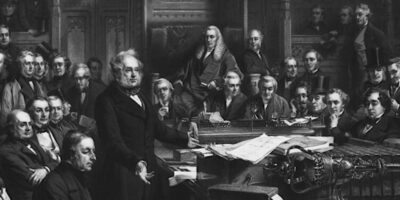Is Protectionism Justified If Trade Liberalization Causes the Wages of Low-Skilled Workers to Fall?
The popular mind is adept at conjuring up, and clinging to, reasons to fear trade with foreigners. “Imports increase unemployment!” “Rich countries’ high-wage workers can’t compete with poor countries’ low-wage workers!” “Our trade deficits mean that we’re losing at trade!”
Among the great achievements of economists since David Hume and Adam Smith is the exposure of the many flaws — both logical and factual — that fuel these fears. Yet contrary to myth, we economists have not denied the theoretical possibility that free trade, under certain circumstances, can generate outcomes less desirable than those that might be generated by careful, ingenious, and apolitical applications of protectionism. Indeed, economists have led the way in identifying such possibilities.
In the early 19th century, the political economist Robert Torrens was the first to identify the “optimal tariff” — a tariff that causes foreigners to pay us more for our exports. Much more recently, economists developed “strategic trade theory” to pinpoint theoretical conditions under which import tariffs and export subsidies improve the prospects that certain home-country companies will seize monopoly power and profits from foreign rivals.
Adam Smith himself recognized the possibility that retaliatory tariffs imposed at home can enrich citizens of the home country over the long run if those tariffs spur foreign governments to lower their tariffs.
Yet economists understand also that these theoretical possibilities are extreme improbabilities — and made even more improbable by the requirement that government officials always act with full information and without political calculation. The conditions necessary for these possibilities to materialize in reality are so precise and improbable that most economists continue to recommend a policy of free trade.
The Stolper-Samuelson Case for Protectionism
Another theoretical exception to the case for a policy of free trade — and also one that applies only under improbable circumstances — is the Stolper-Samuelson theorem. In 1941, Wolfgang Stolper and Paul Samuelson identified conditions under which free trade, while raising the country’s total income, reduces the incomes of some people not only relative to the incomes of other people, but also absolutely.
According to the Stolper-Samuelson theorem, if a high-wage country opens up trade with a low-wage country, while the total income of each country will rise, the incomes of low-skilled workers in the high-wage country might fall not only relative to the incomes of that country’s high-skilled workers but also absolutely. Here’s an example of how.
Suppose — realistically — that America has an abundance of high-skilled (and hence high-wage) workers relative to low-skilled (and hence low-wage) workers. And suppose that the situation in China is the opposite. If trade barriers between America and China fall, Americans will have a comparative advantage at supplying goods the production of which uses intense amounts of high-skilled labor while the Chinese will have a comparative advantage at supplying goods the production of which uses intense amounts of low-skilled labor. In the U.S., industries that use intense amounts of high-skilled labor will expand; American industries that use intense amounts of low-skilled labor will shrink.
Because under freer trade America’s expanding industries use low-skilled labor less intensively than do America’s shrinking industries, it’s possible that freer trade releases from America’s shrinking industries more low-skilled labor than can, at current wage rates, be profitably employed in America’s expanding industries. To find jobs, therefore, low-skilled American workers might have to settle for accepting lower real wages than they earned before trade was liberalized.
Freer trade with low-wage countries thus not only might cause incomes in the U.S. to become more unequal, it can cause the pay of low-skilled workers to fall absolutely. It is theoretically possible, therefore, that restricting Americans’ freedom to buy imports from China and other low-wage countries can raise both the relative and absolute incomes of today’s low-skilled workers in America.
Ceteris Is Not Paribus
It’s undeniable that low-skilled American workers who confront newly intensified competition are at risk of having their incomes fall absolutely and not merely relative to the incomes of workers with more skills. But this fact is much less relevant than it initially appears. The reason is that the prevailing array of skills in the workforce is not determined randomly. Nor is it fixed. Today’s array of skills is determined by, and reflects, the relative returns to — the relative wages of — different skill levels. Importantly, if those relative returns change, the distribution of skills in the workforce will change in response.
In America today high-skilled labor is abundant relative to low-skilled labor because over time it paid a large portion of American workers to become more skilled (or, in some cases, it paid employers to assist their workers to become more skilled). If the relative returns to workers of becoming high-skilled had been lower, a smaller portion of the American workforce would today be high-skilled and a larger portion of the workforce would be low-skilled. Therefore, when the relative returns to different skill levels change, so, too, do the proportions of different skill levels in the workforce. Of course, this change doesn’t occur instantaneously, but it makes no sense to deny or to ignore such a change.
When the U.S., with its relative abundance of high-skilled workers, begins to trade more freely with countries that have a relative abundance of low-skilled workers, the wages of low-skilled American workers will today indeed fall relative to those of high-skilled American workers. And as Stolper and Samuelson show, if conditions are just right, these low-skilled workers’ wages might even fall absolutely.
But falling relative and absolute wages of American workers with only low skills — or, put differently, rising relative and absolute wages of American workers with high skills — itself incites more workers than previously to enhance their skills. Thus, what in the short run is seen as a justification for protectionism — namely, the propping up of wages of low-skilled workers — is in the long run seen to be a cost of protectionism. After all, no country grows prosperous by dampening its citizens’ incentives to improve their skills as workers.
Intensified incentives for workers to further improve their skills is one longer-run benefit of freer trade for economies, such as that of the U.S., in which low-skilled labor is relatively scarce. In fact, workers’ incentives to transform themselves from low-skilled to high-skilled employees are even stronger in high-wage economies if the Stolper-Samuelson theorem applies in reality and freer trade causes the wages of low-skilled workers to fall not only relative to the wages of high-skilled workers but also absolutely.
One general conclusion from these considerations is that finding even a single plausible justification for protectionism is practically impossible.











